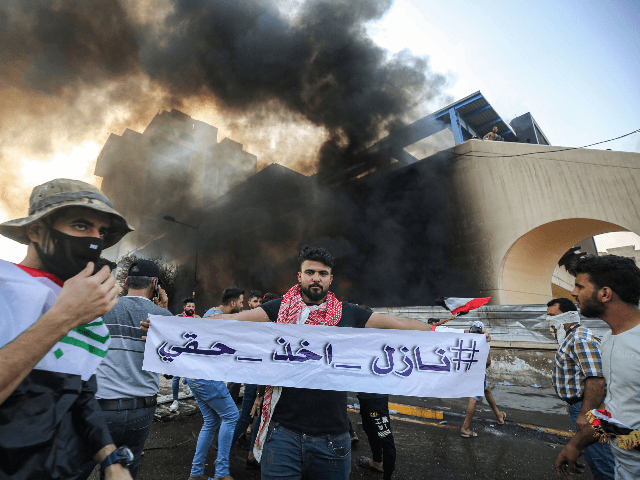Massive demonstrations were held in Baghdad on Wednesday against corruption, government inefficiency, and high unemployment.
At least four people were reportedly killed after the police used live ammunition on the demonstrators after hundreds of injuries were inflicted with water cannons, rubber bullets, and tear gas. Two people were also killed during protests on Monday.
Protest organizers said they organized peaceful demonstrations in Baghdad and other cities that did not become chaotic until security forces attacked them. The United Nations called on the authorities to exercise more restraint, while angry Iraqis demanded an explanation for the use of excessive force from Prime Minister Adil Abd Al-Mahdi and other top officials.
Al-Mahdi responded with allegations that protesters threw firebombs at security officers, stabbed them with knives, and “pillaged” public property. The Iraqi parliament announced it would begin investigating the situation with both its defense and human rights committees.
A statement from parliament on Wednesday recognized “the freedom of peaceful protests that the constitution has guaranteed” and urged security forces to “preserve public order while controlling themselves and not use excessive force on protesters,” while several current and former lawmakers explicitly criticized the Al-Mahdi administration for failing to respect the rights of protesters.
The protests were met by a heavy security presence, including armored vehicles. Streets were blocked and social media was shut down as Iraq faced one of its worst bouts of widespread political instability since the fall of Saddam Hussein. Demonstrations this week have included increasingly forceful calls for the complete overthrow of the government in Baghdad.
The demonstrations were initially driven by economic woes, including high levels of unemployment, which Iraqis find difficult to reconcile with hearty national oil industry. Allegations of corruption swirled and curdled into public fury when badly-maintained public services failed. Electricity has been spotty in Baghdad and other big cities, and the water faucets don’t work as reliably as the police water cannons.
One particular event that angered the protest movement was the surprise sacking last week of popular counter-terrorism commander Abdul-Wahab al-Saadi, widely credited with playing a leading role in the defeat of the Islamic State and the liberation of Mosul.
Saadi, who was essentially demoted and sent back to a desk job in Baghdad, described his treatment as “humiliating” and challenged Al-Mahdi’s authority to dismiss him.
A great deal of the Iraqi public rallied to Saadi’s side, furious at the ingratitude of pushing him aside along with several other commanders seen as political adversaries of the Iran-backed Shiite militia known as the Popular Mobilization Forces (PMF). Saadi has good relations with the U.S. military, and Washington has been pressuring Al-Mahdi to reduce the influence of the PMF as it grows increasingly hostile to American interests, so Saadi’s dismissal looks like a power play by Iran and its allies in Iraq.
Kurdish news service Rudaw interviewed some Iraqi protesters on Tuesday, and came across a group of PMF fighters who complained they are not supported or paid by Baghdad despite playing what they saw as a vital role in fighting ISIS and securing “the rights of the deprived people.”
“There is no public employment. We are tired of the state. Nothing works. There is no paving, no electricity,” one of the protesters told Rudaw.
Among those calling for an investigation of police conduct was Moqtada al-Sadr, the most influential Shiite cleric in Iraq.
The Iraqi Foreign Ministry on Tuesday temporarily closed the Iraqi consulate in the Iranian city of Mashhad, apparently because some Iraqi diplomats in the city were attacked on the street while protests were raging back in Iraq.
Various regional media outlets reporting on the Iraq protests expressed surprise that they seemed entirely organic and leaderless despite having appeared in force virtually overnight.

COMMENTS
Please let us know if you're having issues with commenting.